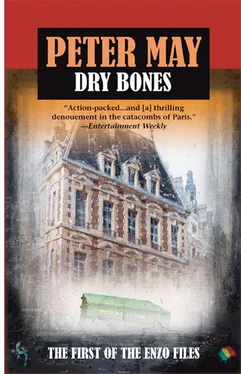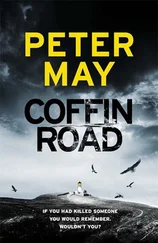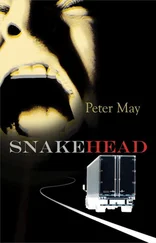‘That’s right.’
‘So wasn’t there a name associated with the first set of clues? The ones found at Place d’Italie?’
‘Philippe Roques,’ Enzo said. ‘But that was just a clue to lead us to the Hospital St. Jacques.’
‘Are you sure about that? The Hugues d’Hautvillers that you originally unearthed was one of the founders of the Knights Templar, wasn’t he? Not the Hugues d’Hautvillers who went to ENA.’
The implications of what she was saying started to dawn on Enzo.
‘She’s right,’ Raffin said. ‘Maybe the clues don’t just lead us to the next body part, but also to one of the killers.’ He typed Philippe Roques into his search engine and hit the return key. ‘Let’s see what comes up.’
There were nearly five hundred links to sites with references to the name of Philippe Roques.
‘ Merde !’ Raffin began scrolling through them. There was a financial expert, a professor of film studies in New York, an expert on downloading music from the internet. There was the Philippe Roques they already knew about, recipient of the Ordre de la Libération, and a Philippe Roques who was head of the Inspection Générale de l’Administration at the Ministry of the Interior. Raffin’s cursor hovered momentarily over the last name, and he tilted his head slightly, staring off into the middle distance. Then he clicked on the name, and up came a biography. Raffin scanned it quickly, and then slapped the palm of his hand down on the table. ‘I knew it!’ And he read, ‘Philippe Roques, fifty-two, rose through the ranks of the IGA before taking advantage, in 1994, of one of several internal promotion opportunities offered each year by the École National d’Administration.’ He turned shining eyes on his ex-lover. ‘Spot on, Charlotte. Roques was at ENA at the same time as d’Hautvillers. Part of the Schoelcher Promotion. Another one of Gaillard’s pupils.’
* * *
They ate in silence in the kitchen, each nurturing his or her own private thoughts. Charlotte had prepared a smoked salmon salad, and they washed it down with a cool, crisp Chablis. A beige, short-haired cat with a huge head and enormous green eyes watched them enviously from the window sill. It looked like an alien, or something recovered by archaeologists from a Pharaoh’s tomb. Charlotte called it Zeke, and when she let it, it would leap on to her shoulders and drape itself around her neck. It was Charlotte who finally broke the silence. ‘So how many killers do you think there are?’
‘Probably as many as there are body parts,’ Enzo said.
‘And how many body parts?’
‘Well, we’ve already found the head, the arms, and the legs. You have to figure there’s not a whole lot more of him left.’
Talk of body parts was not putting Raffin off his salad. ‘This is very good.’ He pushed a final forkful of smoked salmon and Roquefort into his mouth. Then he mopped up the remaining dressing with his bread, cleansed his palate with the last of his Chablis, and wiped his lips with his napkin. ‘I’ve got to make a few phone calls.’ He pointed up the stairs towards the work station. ‘Is it okay?’
‘Sure,’ Charlotte said.
Enzo was still lost in thought. ‘I don’t understand it. Why? I mean, who did they leave these clues for? And why are they giving themselves away, one by one? What kind of game were they playing?’
‘Well, maybe that’s exactly what it was,’ Charlotte said. ‘Some kind of a game. But maybe they thought they would be the only ones ever to play it.’
Enzo looked at her. ‘You’ve studied the psychology of crime. What is it that makes people kill?’
Charlotte shook her head. ‘Like this? I have no idea. There are various theories about what makes people commit crime. There are the so-called social causes — environment, peer pressure. There are situational causes. A set of stressful circumstances perhaps. People crack under stress. Then there are those who commit crime impulsively, usually sexual crimes. Or compulsively, as part of a character disorder or fantasy obsession.’ She sipped at her wine. ‘They are all fairly predictable. My favourite, though, is Fredric Wertham’s theory of catathymic behaviour.’
‘What’s that?’
‘Wertham describes catathymia as the urge to carry an idea through to a violent act. The person imbues the violence with symbolic meaning, and his thinking acquires a delusional quality, which is often marked by rigidity and incoherence. Some situation then arises, creating extreme emotional tension, and leads to the crisis of violence. When it’s over, the person returns to a superficial normality, and the tension appears to have been expunged.’
‘Do you think that catathymia could have played some part in Gaillard’s murder?’
Charlotte smiled. ‘Well, we all get stressed when we’re sitting exams. But we don’t usually kill our teachers. And it would be hard to imagine a group of people all becoming catathymic at the same time.’
Raffin appeared in the doorway at the top of the steps and waved a piece of paper at them. ‘I’ve got an address for Philippe Roques. Why don’t we go and ask him?’
It was nearly ten-thirty by the time their taxi dropped them outside Roques’ apartment. The last light of the day was almost washed from the sky, and even through the light pollution of the city it was possible to see the first faint stars putting in their nightly appearance. The apartment was on the third floor of an upmarket block on the Boulevard Suchet, on the edge of the Bois de Boulogne, not far from the Hippodrome. Charlotte had decided not to come with them.
At a tall gate, Raffin rang the bell for the concierge , and after a few minutes an elderly lady peered at them suspiciously through the wrought iron.
‘Sorry to trouble you, madame,’ Raffin said, turning on the charm. He held up his Press pass. ‘My name’s Raffin. I’m with the Press corps at Matignon. We’re here for a briefing with Monsieur Roques. He is expecting me, but I’m afraid I’ve mislaid my entry code.’
She raised a sceptical eyebrow and it was clear that she did not believe him. But, still, she sighed and opened the gate. ‘Always the same,’ she said. ‘Young men, old men….’ She glanced at Enzo. ‘All with their stories. You people must think I came up the Seine in a bubble.’
Enzo and Raffin exchanged puzzled glances. What on earth was she talking about?
‘Follow me,’ she said, and they did as they were told. She took them through a brightly lit passageway to a wide, paved courtyard ringed by extravagant gardens. Her apartment was on the ground floor adjoining a marble lobby with an elevator and a carpeted staircase. ‘Wait here. I’ll call him.’ She went into her apartment and left the door open.
‘What are we going to tell her when Roques says he doesn’t know us?’ Enzo whispered.
But Raffin was unfazed. ‘I’ll think of something.’
They waited a long time before the concierge returned, scepticism replaced by consternation. ‘I don’t understand it. I saw him coming in. And I know he hasn’t gone out.’
‘There’s no reply?’ Raffin asked. She shook her head. ‘Then he must have slipped out when you weren’t looking.’
‘No.’ She waggled a finger emphatically. ‘If he had gone out again, I’d have seen him.’ She nodded towards a barred window giving on to a small sitting room. A television screen flickered blue in the dark. ‘I always hear the elevator. Besides, young Luc hasn’t been out all day.’ She was clearly at a loss for what to do, and more than a little apprehensive. ‘Will you come up with me?’
‘Of course, madame.’
The three of them took the elevator to the third floor and stepped out on to a thick-piled carpet. The walls of the landing were painted a rich cream above polished mahogany panelling. There were doors to two apartments set into opposite angles of the hallway. Roques’ nameplate was on the left-hand door.
Читать дальше












